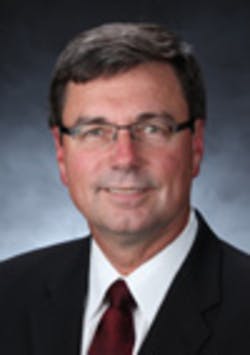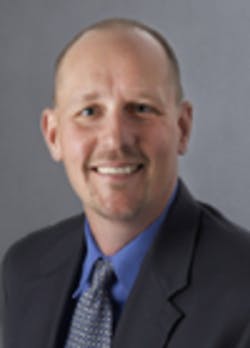Execs Describe FormFactor's MicroProbe Acquisition
Aiming to become the largest probe-card manufacturer in the industry, FormFactor acquired MicroProbe in October 2012. Tom St. Dennis, FormFactor CEO, and Mike Slessor, former CEO of MicroProbe and now head of FormFactor’s MicroProbe Business Unit, discussed the acquisition and the path forward in an interview at the 2012 International Test Conference in Anaheim, CA, where FormFactor and MicroProbe made the first public appearance as a united company.
The executives positioned the MicroProbe Product Business Unit as the leading supplier in the high-growth SoC market of MEMS, vertical, and cantilever probe cards. Slessor said MicroProbe has shipped more than 2,500 MEMS probe cards to date. The SoC business, said Slessor, is driven by mobile and connectivity devices, and at the time of the interview, MicroProbe expected to deliver $100M worth of SoC solutions in 2012.
In the combined organization chart, Slessor’s unit operates in parallel with the FormFactor Product Business Unit under the direction of Tony Tryba, and both units will be responsible for engineering and design, product management, quality, supply-chain management, and manufacturing. Both Slessor and Tryba report directly to St. Dennis. Other business units, also reporting to St. Dennis, handle functions such as finance, legal, sales and service, and human resources.
For its part, said St. Dennis, FormFactor has concentrated on memory probe cards, adding that the company felt it essential to move beyond memory-centric technology to survive and thrive long term. There is some commonality in markets addressed in the SoC wirebond space by FormFactor’s TrueScale Matrix (introduced in June) and MicroProbe’s Cantilever product lines. But for the most part, MicroProbe offers Apollo and Vx products for SoC grid-array applications and the QiLin product for SoC WLCSP (wafer-level chip-scale packaging) space while FormFactor provides products including Takumi for parametric applications, SmartMatrix and HFTAP for DRAM applications, and TouchMatrix for flash applications.
St. Dennis emphasized the minimal overlap in the FormFactor and MicroProbe product lines. “We have never lost an order to MicroProbe,” he said. He also explained that FormFactor and MicroProbe do share common technologies, adding that FormFactor’s focus on full-wafer contact can be leveraged in the SoC space. St. Dennis added that the company is poised to take the best from each to address issues related to performance, cost, and speed. The combined organization also will share a supply chain and exploit combined buying power.
St. Dennis noted that FormFactor was founded in 1993 and that MicroProbe was founded in 1973; therefore, “The combined companies bring about 60 years of experience to the industry.”
FormFactor is headquartered in Livermore, CA. Post-acquisition, it has sales, service, repair, and design centers in Japan, Korea, Taiwan, Singapore, the European Union, China, and the United States. It has manufacturing and R&D centers in California (Livermore, San Jose, and Carlsbad) and China. The firm employs 1,100 people, 275 of whom work outside the United States in customer-facing roles. It holds 646 U.S. and foreign patents and has submitted 327 additional patent applications. The company has $170M in cash and no debt.
The executives noted that FormFactor invests about $10M per quarter in R&D as it strives to keep pace with its vendors’ silicon bring-up and production. Slessor reported that MicroProbe experienced about 46% growth in 2011 with 20% EBITDA margins. St. Dennis added that post-acquisition, FormFactor is the largest probe-card company in the semiconductor industry with revenues of about $260M.
At its International Test Conference debut, the combined company participated in a poster session on parallel parametric test in semiconductor production in conjunction with Agilent Technologies; participants included Masaharu Goto of Agilent Technologies International Japan and Larry Levy of FormFactor. And in a session during the 3-D Test Workshop, Amy Leong and Andrew McFarland of FormFactor joined with Joseph Foerstel of Altera on a 3-D wafer probing session titled “40-µm Pitch Probe Card Evaluation.”


